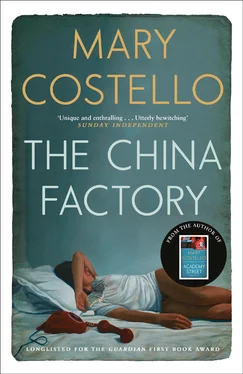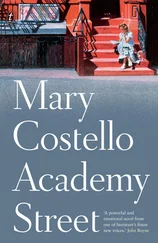From the window she can see the car snaking uphill and she breathes deeply and stands ready. The sea is shining in the evening light. She has a clear view of the parish hall and the church and, a little further on, closer to the water, the cemetery. Cars are parked along the road and people in bright summer clothes are moving towards the hall.
When his children, first one, then two, then four daughters, were born she had thought that when the time came she would not be able to teach them. She remembers a June day, years before, when she brought flowers to her father’s grave and stood there trying to call up some memory of him, distracted by the sun gleaming on stone and sand and by the birds singing — one bird praising the day with the same two notes ch-wut, ch-wut, ch-wut over and over — and then others with their own chorus, chwee, chwee, chwee , and she trying to recall her father but nothing coming except the child, and the birdsong gradually growing louder and shriller as if all the notes were tumbling into disharmony and all the birds into disagreement until she could bear it no longer and ran from the grave.
But she had scarcely reached the path when there they were — a vision before her, like the holy family — coming over the stile. Hughie, lifting the smaller girl, then the bigger one, and finally, reaching out a hand to Marie, as she twisted her body, swollen with child, through the stile. She was wearing a green summer dress and flat white canvas shoes. Her arms were bare and freckled. The small children and small platitudes saved Alice. And Marie, open and friendly and oblivious, so familiar, so at one with him by her side, that Alice had an image of their married life — of Marie washing and folding his shirts, his socks, his underthings, of nighttime and warm sheets and the smell of their bodies, of whispers, and shared physical things. And then Marie telling her that Imelda would be starting school in September, and then Imelda, with something wriggling in her arms, leaning forward and dropping it. A small black pup came tumbling towards Alice and sniffed her shoes and wagged its tail joyously. Marie smiled and Alice smiled too and looked down, and then he bent down suddenly, fiercely, and scooped up the pup, chastising it, and he cast his eyes briefly, shamefully, on hers. As he withdrew, his arm brushed against the swollen belly, and Marie placed a hand lightly on her stomach and looked up at him, a knowing look, and Alice saw it for what it was, saw what Marie was showing her, what all women in this state proudly, shamelessly, declare to the world: the potency of their men, their private married acts, their fecundity, their triumph. This is what he has done to me, this big belly. This is his seed he has planted in me. This is his child I am bearing .
She sits next to the driver as they bump down the lane and onto the main road. As they approach the hall she becomes agitated and asks him to drive on a little. They pass the hall and he turns off left towards the cemetery and the shore. He pulls over at the bridge, and says in a gentle voice that it can be hard, sometimes, to face people. She looks at him for a second, this local man with soft blue eyes, and she is moved with gratitude to him.
The priest and the principal receive her at the door and she is ushered into the hall where everyone is waiting. They stand and clap and she follows the two men to the top table. The microphone is switched on and the evening is announced. During the meal she nods and smiles and talks to those next to her. She knows all the words and all the answers that are required. She picks up her fork and brings food to her mouth. She feels the blood pulse through her temple. She closes her eyes for a second. Oh, to be far from here .
The parish committee presents her with a suite of crystal goblets and a wallet of notes and she is lauded for her work and dedication. She is handed the microphone and tremulous words issue from her mouth about the fine people and the beautiful children of the parish. The tables are tidied away and everyone wants to talk to her. She will miss the job, she tells them. It is the truth. She will miss seeing the new batch of infants every September, eager and expectant and glowing. She will miss listening to their first faltering attempts at reading, and watching their tense bunched-up fingers grip a pencil and start to write.
Grown men and women, whom she cannot place, take her hand and hold it and recount classroom tales that she cannot recall. She is sitting at the top of the hall, as if at an altar, receiving them, and they bow a little, genuflect almost, and then retreat. All evening she has held herself steady, and now, out of the blue, odd thoughts and images begin to encroach. She thinks of the pink hairband lying in the garden, and imagines it being carried there by some nocturnal animal while she slept. She thinks of boats edging out into the great Atlantic swell, nudging over waves in the dark and then anchoring, and the fishermen unspooling nets, with the hum of the ocean and the heavens in their ears. She thinks of a city street far away and houses with wooden porches and dark, damp crawl spaces underneath that would frighten a child. They lean down, these strangers, these overgrown children, and kiss her cheek now as if they know her, as if she is theirs, and as they straighten she looks at their faces, aghast, and for a moment she is far from this place, out in the ocean, cast alongside a big ship among dolphins and screeching gulls and desperate calls and cries and goodbyes. She would like to flee the hall now, or rise up to the rafters, to the dark shadows, to some quiet hiding place in her heart. Give Mammy a birdie, I said that day, and you cackled and lowered your head to mine and we nuzzled noses and I kissed you on the lips and the face and the eyes, my sweet delicious child .
She makes her way down the hall to the ladies’ toilet at the far end, grateful for the chance to walk, stopping a few times when she is waylaid. Then, as she is about to enter, she feels a light touch on her elbow.
‘Alice, how are you?’ She turns and looks up at Hughie Sweeney. He puts out a hand and she stares, shocked, at the hand that takes hers and she cannot wait to snatch it back again. ‘I just wanted to say, good luck, you know, and… well… to wish you all the best.’
She gathers herself. ‘Oh, thanks, Hughie, thanks, but sure I’m not going anywhere.’
‘I know that, I know that. Still… all the same…’ For a moment she thinks he is going to say something terrible.
‘How’re all the family? Imelda and Helen?’ she asks quickly. ‘Their kids must be getting big now. And the twins!’
It had not been difficult to teach his girls at all. Imelda came in that first morning, the sweetest thing, with his eyes and his earnestness and his anxieties, and then Helen and later the twins, bright and polite and diligent. And one day, when Imelda was twenty and training to be a teacher herself, she stood at Alice’s classroom door to request some book, this beautiful, dark-haired intelligent girl, and Alice thought, You would have found me, you would have come looking, you would have trawled the ends of the earth and found me .
‘Oh, aye, Imelda’s eldest is at university now and Helen’s one is — God, I suppose, he’ll be starting soon too. Helen herself gave up work for a few years to mind the smaller ones.’
‘Ah, sure it’s hard to do both.’
‘Aye, it is.’
There was a time when she had hardened her heart towards him. When she had walked past him at the school gate or at the church door, with anger and resolve and pride in every stride. And let her back fix him firmly with blame.
They stand a little awkwardly now.
‘Aye, that’s the way,’ he says then. She smiles and makes to move away. ‘Things have changed a lot,’ he continues, a little urgently. ‘You’d have noticed that in the school too.’
Читать дальше












